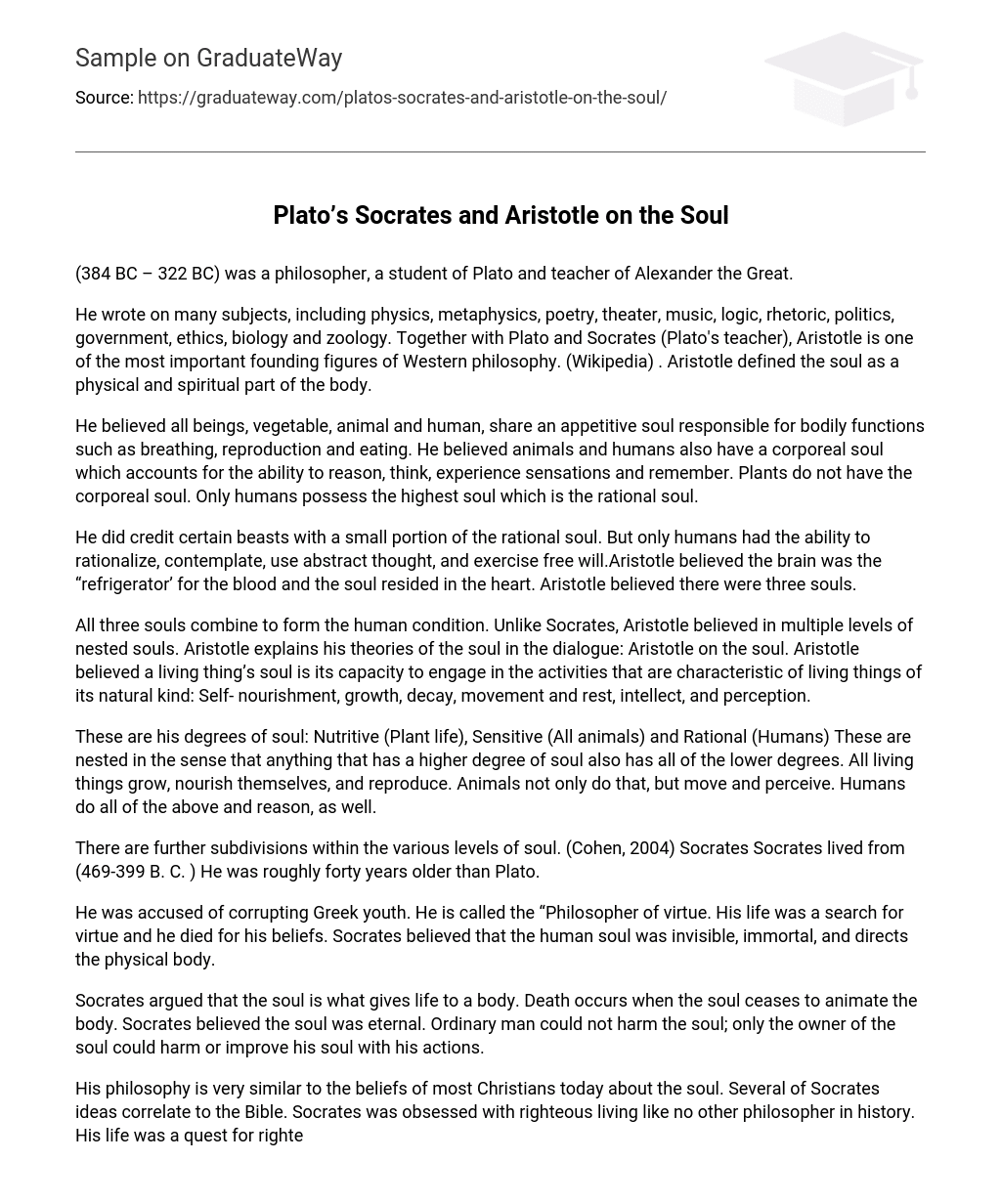Socrates, an ancient Greek philosopher, was born in 384 BC and died in 322 BC. He studied under Plato and later became the teacher of Alexander the Great.
According to Wikipedia, Aristotle was a prolific writer who covered a wide range of subjects, including physics, metaphysics, poetry, theater, music, logic, rhetoric, politics, government, ethics, biology and zoology. Like Plato and Socrates before him,
he made significant contributions to the progress of Western philosophy. Additionally,
he offered a definition of the soul that regarded it as having both physical and spiritual aspects.
According to one’s beliefs, every living being possesses an appetitive soul which governs physiological processes such as respiration, procreation, and nourishment. Both animals and humans also possess a corporeal soul that allows for reasoning, cogitating, sensing experiences, and recalling memories. In contrast, plants do not possess a corporeal soul. The rational soul is considered the most superior type of soul and is exclusive to human beings.
Aristotle posited that animals possessed a fraction of the rational soul, whereas humans were distinct in their capacity for reasoning, contemplation, abstract thinking, and free will. Aristotle viewed the brain as a “refrigerator” for blood and believed that the soul resided in the heart. Additionally, Aristotle suggested the existence of three souls.
Both Socrates and Aristotle delve into the concept of the human condition and its connection to the soul. While Socrates upheld the idea of an individual soul, Aristotle proposed that there are multiple nested souls. In his work “Aristotle on the soul,” he explains his theories about the soul. According to Aristotle, an organism’s soul represents its ability to partake in activities specific to its inherent nature, including self-nourishment, growth, decay, movement and rest, intellect, and perception.
The soul is divided into three levels: Nutritive, Sensitive, and Rational. Plants have the Nutritive level of soul, animals have the Sensitive level, and humans have the Rational level. These levels are interconnected, meaning that any being with a higher level of soul also possesses all lower levels. All living organisms experience growth, self-sustenance, and reproduction. In addition to these traits, animals can move and perceive their surroundings. Humans possess all mentioned characteristics as well as the ability to reason.
According to Cohen (2004), there are additional subdivisions in the different levels of soul. Socrates, who was approximately forty years older than Plato, lived from (469-399 B. C. ).
Accused of corrupting Greek youth, Socrates earned the title of “Philosopher of virtue” and devoted his life to the pursuit of virtue. He ultimately died for his beliefs. Socrates held the belief that the human soul is invisible, immortal, and possesses control over the physical body.
According to Socrates, the soul provides life to the body and ceases to do so upon death. He believed that the soul is eternal and that only its owner can harm or improve it through their actions.
Socrates held a philosophy that aligns closely with the soul-related beliefs of most modern-day Christians. Many of his ideas are reminiscent of the teachings found in the Bible. Socrates’s dedication to leading a virtuous life was unparalleled among philosophers throughout history, as his pursuit was focused on righteousness.
Socrates and Phaedo engage in a dialogue discussing Socrates’ beliefs about the soul. The Phaedo starts with Cebes posing questions to Socrates while he is in prison. Cebes wonders why Socrates is imprisoned, to which Socrates explains that he was influenced by a dream. The conversation between Socrates and Cebes then delves into the topic of suicide, ultimately leading to an exploration of the soul.
According to him, the philosopher’s soul is their true essence and continues to exist even after their physical body has perished. In contrast to Christians, Socrates believed that virtuous actions had an immediate impact on the soul, leading to immediate rewards. Socrates’ ideas significantly influenced numerous Greeks, including Plato, and continued to be upheld in various philosophical schools throughout time.
These ideas have greatly influenced the development of western philosophy. The Phaedo and Aristotle on the Soul shed light on the main distinction between these two philosophers: their perspectives on the plurality of the soul. Socrates believes in a solitary spiritual soul, whereas Aristotle advocates for the presence of several souls that govern both physical and spiritual aspects of existence. Aristotle perceives a strong link between the physical and spiritual realms.
Socrates and Aristotle hold different perspectives on the connection between the body and soul. While Socrates advocates for a distinct separation, both philosophers recognize the importance of the spiritual aspect of human beings. Nonetheless, Aristotle diverges from Socrates by ascribing bodily functions to the soul instead of considering it solely as a state of spirituality.





